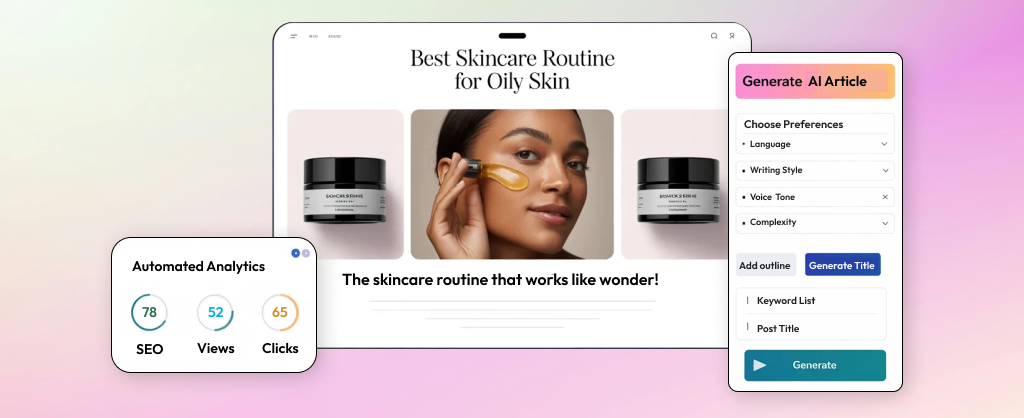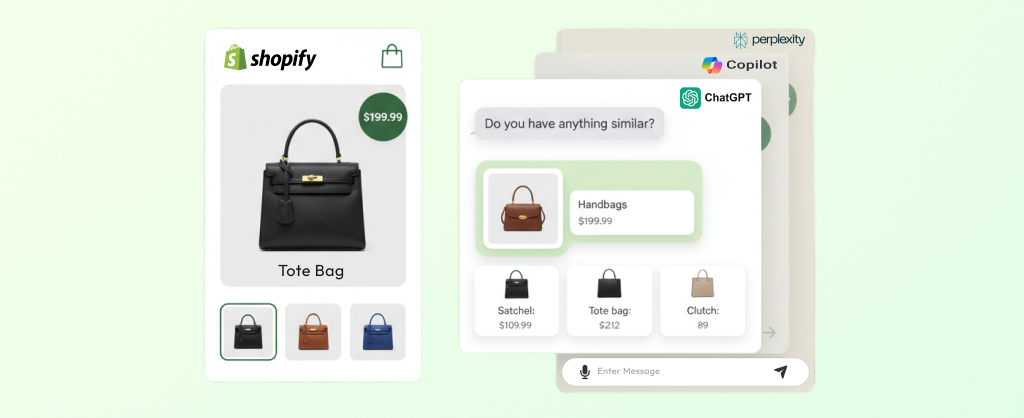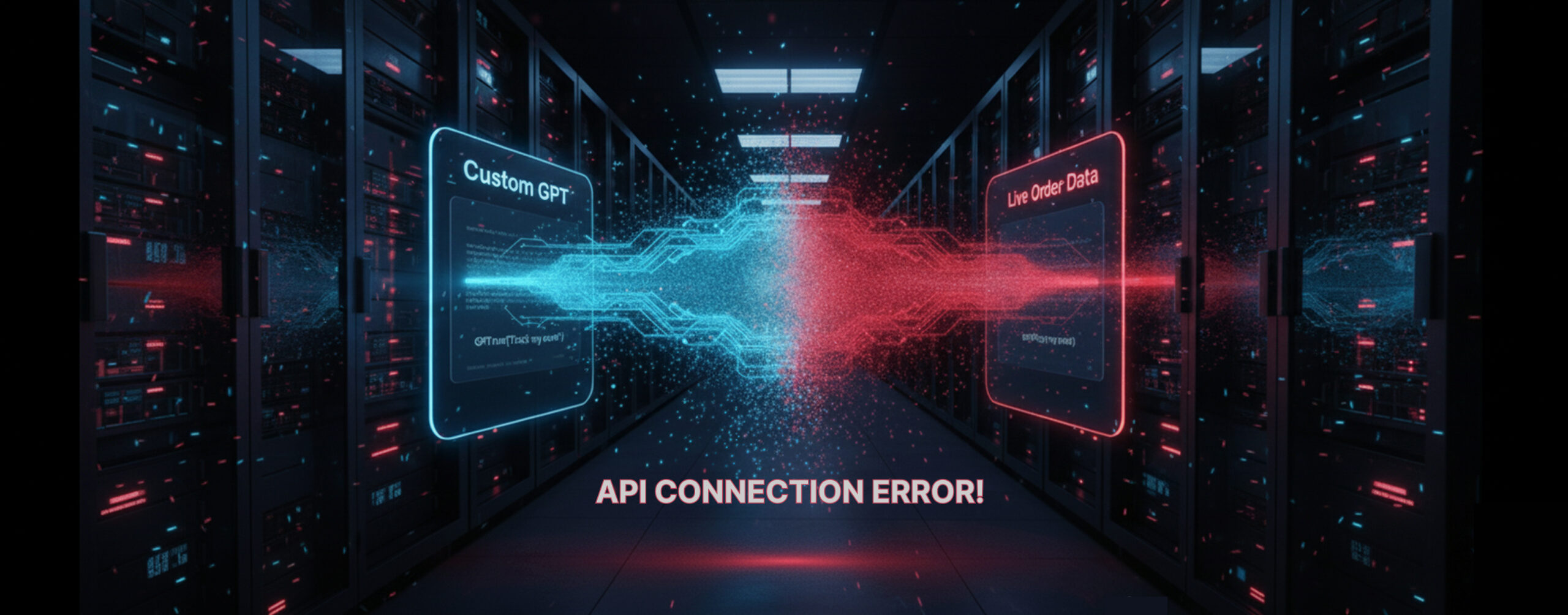
Custom GPT: What Works & What Doesn’t
Custom GPTs let you build your own version of ChatGPT, tailored to your needs, without writing a single line of code. However, as with any tool, they come with strengths and limitations.
Many businesses start with custom GPTs to automate tasks such as employee onboarding or for generating campaign content. These setups work well for structured workflows. However, they often hit roadblocks when it comes to things like— persistent memory, secure client data handling, API integrations, or automated publishing.
Custom GPT limitations are felt across e-commerce, healthcare, finance, and many other industries. However, our AI developers can solve it with custom AI solutions like a custom-built chatbot. If you’re facing similar challenges, consult our AI chatbot development company and get your business on track.
In this blog, we’ll walk through what Custom GPTs can and can’t do and when it’s time to upgrade to custom AI solution or create an AI chatbot to overcome these limitations.
Let’s get started.
What Can Custom GPTs Do?
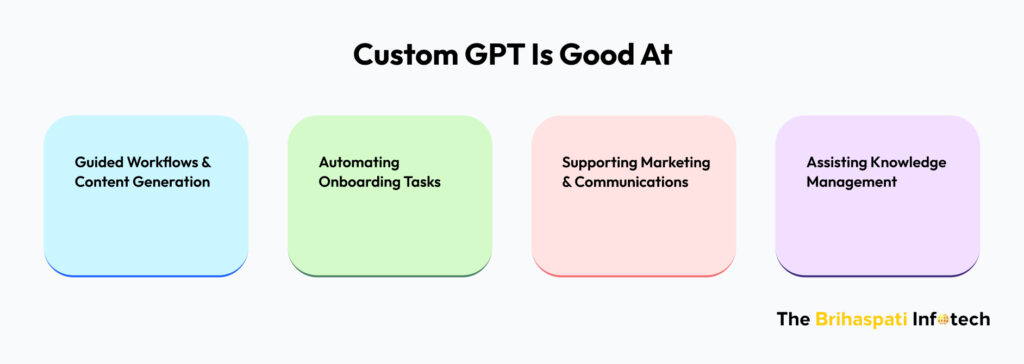
Custom GPTs are useful when applied to the right types of tasks. Their strengths fall into a few broad categories that almost every industry can relate to.
1. Guided Workflows & Content Generation
Custom GPTs are good at processing repeatable, step-driven processes. For instance:
- Generating FAQs for customer service.
- Writing first drafts of policy documents, product manuals, or instructions.
- Standardizing reports or summaries in a fixed format.
Any task that benefits from consistency and repeatable structure is a natural fit.
2. Automating Onboarding Tasks
Onboarding, from HR to client services, involves collecting and turning information into structured outputs. A custom GPT can:
- Summarize long forms or questionnaires.
- Produce profiles, briefs, or welcome documents.
- Answer new-user questions in a conversational way.
3. Supporting Marketing & Communications
Custom GPT for marketing can quickly produce different types of content for promotional campaigns.
- Blog outlines and first drafts.
- Social media captions tailored to different platforms.
- Press release drafts or internal announcements.
It’s not about replacing humans, but GPT reduces the time spent on mundane writing tasks.
4. Assisting Knowledge Management
Another overlooked strength is knowledge management. Custom GPTs can:
- Summarize research reports.
- Convert technical documents into plain-language summaries.
- Act as internal “how-to” assistants trained on company guidelines.
This is valuable for industries like healthcare, education, and consulting where information needs to be distilled and reused.
Custom GPTs work best for structured, repeatable, content-heavy workflows. They can’t be considered a replacement for backend systems or live apps. However, they shine wherever text, consistency, and structure matter.
What Custom GPTs Can’t Do?
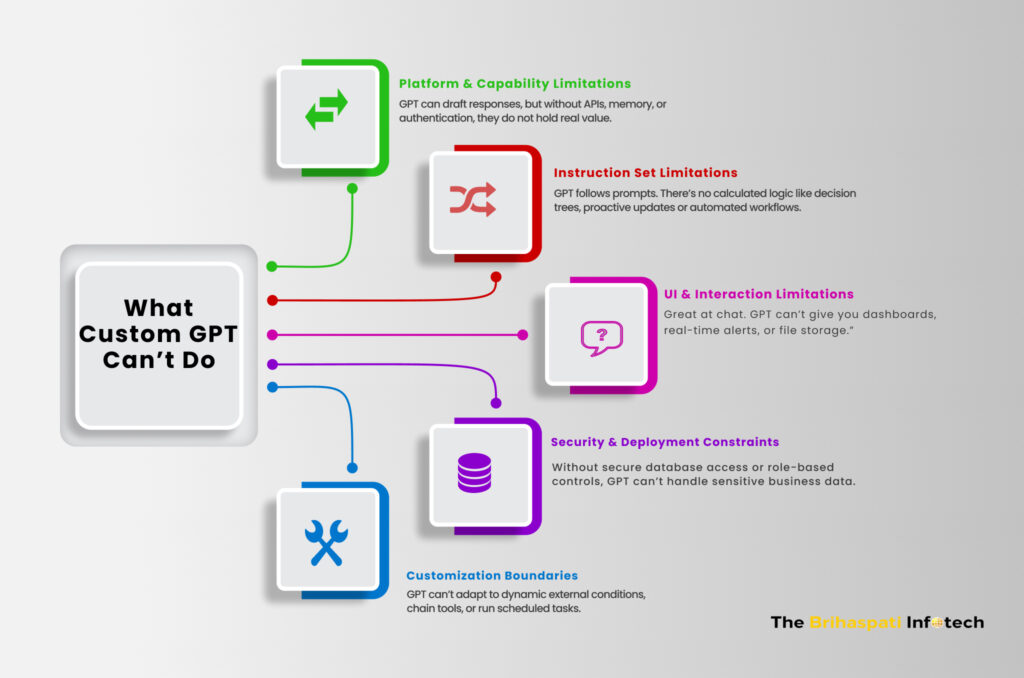
Custom GPTs are powerful, but they aren’t a complete business solution. They work best for content and structured workflows, but they fall short when businesses need integration, automation, or personalization.
1. Platform & Capability Limitations
- No Backend Logic or Server Execution
GPTs can’t run server-side code (like Node.js or Python scripts). They’re not built to manage inventory, transactions, or logistics.
- No External API Calls (Without Plugins)
GPTs can’t connect to third-party systems for real-time updates.
- No Persistent Memory Across Sessions
GPTs forget once a session ends, making them unsuitable for long-term personalization.
- No Authentication or User Identification
GPTs don’t distinguish users. This makes secure, role-based access impossible.

Example: For instance, an e-commerce company can use a custom GPT for real-time order tracking. It can generate order-related responses, but it can’t authenticate users, fetch live data from retail store, or update records in the backend.
2. Instruction Set Limitation
- Limited Logic or Conditional Workflows
GPTs can’t run complex decision trees or approval processes. - Prompt-Based Only
GPTs won’t act on their own, so do not expect proactive updates, reminders, or real-time monitoring.

Example: For instance, a financial services firm can’t use GPT to automatically push daily portfolio updates. It only reacts when prompted and can’t run conditional workflows. This can significantly affect trading and other financial practices.
3. UI & Interaction Limitations
- No Custom UI Components
GPTs remain chat based. They do not provide dashboards, forms, and analytics. - No File Storage or State Management
Uploads are temporary — GPT won’t serve as a document repository. - No Real-Time Interaction
GPTs don’t trigger alerts or stream live updates.
Example: For instance, a healthcare app can’t use GPT as a live dashboard for patient data. It can summarize reports, but it won’t store files or display real-time updates.
4. Security & Deployment Constraints
- No Database Access
GPTs can’t query or update records in a CRM or ERP without using APIs or middleware. - No Plugin Sharing
Even if plugins are enabled, they can’t be bundled and shared with others.
Example: For instance, a law firm can’t depend on GPT to securely manage client case files. It can review documents in-session, but it can’t connect to databases or enforce role-based access.
5. Limited Customization
- Static Personality & Behavior
GPT behavior doesn’t adapt dynamically to external factors such as regulations. - Limited Tool Chaining
GPTs can use built-in tools but can’t orchestrate multi-step workflows across multiple systems. - No Scheduled or Background Tasks
GPTs can’t run cron jobs or push weekly summaries without manual prompts
Example: For instance, a marketing agency can’t expect GPT to automatically publish weekly campaign reports. However, it can generate content for marketing and branding.
How Are Custom GPTs Failing Industry-Wide?
Custom GPTs shine in structured workflows, but when industries demand real-time data, secure integrations, or persistent memory, they quickly reach their limits. Here are a few examples:
| Industries | Purpose | Limitations | Suggested Solution |
| Retail & E-commerce | Merchants want a custom GPT to help users track orders and provide shipping updates or recommend products. | 1. Fail to authenticate users to access private order data 2. Cannot make real-time API calls to Shopify 3. No way to store or retrieve user-specific session memory | A custom chatbot can integrate directly with e-commerce APIs, authenticate users, and provide live order tracking. |
| Healthcare & Fitness | A fitness app wants a custom GPT to offer personalized coaching based on user history, workout data, and wearable integration. | 1. No ability to track users across sessions 2. Cannot integrate live data from Apple Health, Fitbit, etc. 3. Lacks background task execution | Mobile app backend with persistent user data + GPT API integration |
| Legal | Law firms want a GPT that can analyze contracts and retain client preferences to maintain context over long-term engagement. | 1. Can’t retain memory across sessions 2. Can’t ensure data confidentiality 3. Limited to single-session document handling | A role-based SaaS platform with GPT integration can securely store documents, retain client context, and deliver AI-assisted legal drafting. |
| Finance & Trading | Financial services need a GPT that accesses live market data and provides stock suggestions. | 1. Cannot access real-time market data 2. Lacks event-driven triggers or real-time notifications 3. Prohibited to share regulated financial advice | A custom trading assistant can connect to real-time data pipelines, provide compliance-checked insights, and use GPT for generating reports and explanations |
When to Upgrade from Custom GPT to AI Chatbot?
A custom GPT is a great AI solution for content generation and simple workflows. But if your business requires scalability, integrations, or automation, GPT alone will not be enough.
That’s where a custom chatbot or full-stack AI solution comes in.
Potential Situations Where Custom GPT Falls Short:
1. Persistent Client Memory Across Sessions
Unlike GPTs, chatbots can store data, remember users, and provide continuity across multiple interactions. It works great for industries like healthcare, legal, or fitness.
2. CRM/Database Integration
Custom chatbots can connect directly to CRMs, ERPs, or databases, collecting data, updating records, or retrieving history in real time.
3. Automated Publishing & Actions
Chatbots can push content or updates directly into CMS platforms, social media accounts, or customer portals. GPTs can create a ‘draft’ and chatbots can handle ‘delivery’.
4. User Authentication & Role Management
Custom AI solutions allow secure logins, role-based access, and audit trails. This is something GPTs cannot manage.
5. Dashboards, Reporting & Scheduling
AI chatbots can generate powerful dashboards, deliver performance reports, and schedule automated tasks (like weekly updates or campaign monitoring).
Let’s start building a chatbot or custom AI solution for your business.
Frequently Answered Questions
A custom GPT is best for structured, prompt-driven content generation. A chatbot, on the other hand, can authenticate users, connect to databases, run background tasks, and automate workflows. AI chatbots are a better fit when businesses need to scale.
Not directly. GPTs can’t pull live data from APIs like Shopify, stock markets, or healthcare wearables unless external integrations are added. Please note, custom GPTs are assistants and not live data engines.
Custom GPTs can handle sensitive documents in a single session. However, they don’t provide long-term data storage, role-based access, or compliance guarantees. Such businesses need a custom AI solution to stay protected from evolving cyber threats.
Start with a custom GPT for content and workflow support. It’s quick to set up and delivers immediate efficiency. As its value is realized, you can build a custom chatbot or AI platform for persistent memory, integrations, and automation.
Custom GPT is relatively cheaper and quick to set up, making it ideal for early AI adoption. A custom chatbot or AI platform requires relatively more investment. However, they are compatible for integrations, automation, compliance, and scalability.
It depends on how much your business is ready to invest on AI. We can create a custom AI strategy, helping you achieve your business goals within a tailored budget.
Schedule AI strategy call and get started.
Looking for Solutions Beyond Custom GPTs?
Custom GPTs are powerful tools, but only when used in the right context. They are good at structured content generation, onboarding briefs, FAQs, and marketing support, making them suitable for implementing AI.
But if your business workflows demand real-time data, persistent memory, secure integrations, or automation, GPTs succumb to their limits. That’s where custom chatbots and full-stack AI solutions become essential.
At The Brihaspati Infotech, we recommend a hybrid approach:
- Start with a custom GPT to handle content-heavy, prompt-driven tasks.
- Scale with a custom chatbot or AI platform if you need automation, integrations, and enterprise-level control.
Let’s build a strong and flexible foundation of a modern AI strategy for your business. A startup, small business, or a growing company, we got you covered.
Stay Tuned for Latest Updates
Fill out the form to subscribe to our newsletter



